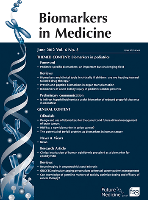
EXPERT REVIEW OF MOLECULAR DIAGNOSTICS
Scope & Guideline
Empowering Researchers with Cutting-Edge Reviews
Introduction
Aims and Scopes
- Molecular Diagnostic Technologies:
The journal covers a wide array of molecular diagnostic technologies, including next-generation sequencing, PCR, and liquid biopsy methods, emphasizing their applications in various diseases such as cancer, infectious diseases, and genetic disorders. - Biomarker Discovery and Validation:
A significant focus is placed on the identification and validation of biomarkers that can aid in the diagnosis, prognosis, and treatment response monitoring in various conditions, particularly cancers and chronic diseases. - Point-of-Care Testing:
The journal highlights the developments in point-of-care testing (POCT) technologies, examining their role in improving accessibility and timeliness of diagnostics, especially in resource-limited settings. - Emerging Infectious Diseases and Diagnostics:
Research on the molecular diagnostics of emerging infectious diseases is a core area, especially in the context of global health challenges such as the COVID-19 pandemic. - Translational Medicine and Clinical Applications:
The journal emphasizes the translation of laboratory research into clinical practice, focusing on how molecular diagnostic advancements can be integrated into routine healthcare to improve patient management.
Trending and Emerging
- Liquid Biopsy and Non-invasive Diagnostics:
There is a growing emphasis on the use of liquid biopsies for cancer detection and monitoring, as well as for other diseases, reflecting a trend towards non-invasive diagnostic methods that provide real-time insights into disease status. - Integration of Artificial Intelligence in Diagnostics:
The incorporation of artificial intelligence and machine learning techniques in diagnostic processes is trending, with studies focusing on improving diagnostic accuracy and efficiency through data-driven approaches. - Multi-Omics Approaches:
Research is increasingly adopting multi-omics strategies, combining genomics, proteomics, and metabolomics to provide a more comprehensive understanding of disease mechanisms and improve diagnostic precision. - Point-of-Care Innovations:
There is a notable increase in research related to innovative point-of-care testing solutions, especially in the context of rapid diagnostics for infectious diseases and chronic conditions, highlighting the need for accessible healthcare solutions. - Biomarkers for Personalized Medicine:
Emerging themes focus on the identification of biomarkers that can guide personalized treatment strategies, particularly in oncology, reflecting a trend towards tailored therapeutic approaches based on individual patient profiles.
Declining or Waning
- Traditional Diagnostic Methods:
There has been a noticeable decrease in publications related to traditional diagnostic methods, such as histopathology and serological testing, as the field increasingly shifts towards molecular and genomic approaches. - Basic Research without Clinical Application:
Papers focusing solely on basic research without clear clinical implications or applications are becoming less frequent, as the journal prioritizes studies that bridge the gap between research and clinical practice. - Single Biomarker Studies:
Research centered around single biomarker assessments without a multi-omics or systems biology approach is declining, reflecting a trend towards more comprehensive diagnostic strategies that consider multiple biomarkers and pathways. - Static Diagnostic Technologies:
The exploration of static or outdated diagnostic technologies is waning, as the field moves towards innovative, dynamic, and high-throughput technologies that can provide better diagnostics. - Non-integrative Studies:
There is a decrease in studies that do not integrate molecular diagnostics with other clinical data or advanced analytics, as the trend is moving towards more holistic and integrative approaches to patient diagnostics.
Similar Journals

JOURNAL OF CLINICAL PATHOLOGY
Elevating Standards in Diagnostic ExcellenceJOURNAL OF CLINICAL PATHOLOGY, published by BMJ PUBLISHING GROUP, stands at the forefront of advancements in the field of clinical pathology, offering a platform for groundbreaking research and insights from 1948 to the present. With an impressive impact factor and categorized as Q1 in both Medicine (miscellaneous) and Pathology and Forensic Medicine for 2023, the journal holds a distinguished position in the academic community, ranking 22nd out of 208 journals in its category on Scopus and representing the 89th percentile. While the journal does not currently offer open access, it remains a vital resource for researchers, healthcare professionals, and students seeking to stay current with innovative methodologies, clinical techniques, and diagnostic advancements. Located in London, United Kingdom, the journal aims to bridge the gap between laboratory findings and clinical practice, emphasizing the importance of evidence-based pathology in improving patient care and treatment outcomes. Engage with the JOURNAL OF CLINICAL PATHOLOGY to enhance your understanding and contribute to the evolving landscape of clinical pathology research.

ANNALES DE BIOLOGIE CLINIQUE
Connecting Science and Practice in BiomedicineANNALES DE BIOLOGIE CLINIQUE is a prominent French journal dedicated to advancing the fields of Biochemistry, Genetics, Molecular Biology, Immunology, and Microbiology. Published by JOHN LIBBEY EUROTEXT LTD, this journal has been a pivotal resource since its inception in 1945, offering a rich archive of original research, reviews, and clinical studies that aim to bridge the gap between laboratory findings and clinical applications. Despite its ranking in the Q4 quartile within several scientific categories according to the 2023 Scopus rankings—positioning it at #395/636 in General Medicine and #198/221 in General Biochemistry—ANNALES DE BIOLOGIE CLINIQUE serves as a vital platform for emerging researchers and seasoned professionals alike, fostering collaboration and innovation in these vital areas of health science. As an essential tool for researchers and scholars, the journal does not currently provide open access; however, it continuously strives to enhance its impact and visibility in the scientific community through rigorous peer-reviewed content and educational contributions.

Cancer Genetics
Pioneering Research at the Intersection of Genetics and OncologyCancer Genetics is an esteemed peer-reviewed journal dedicated to advancing the field of cancer research through the lens of genetics. Published by Elsevier Science Inc and available in both print (ISSN: 2210-7762) and online (E-ISSN: 2210-7770), this journal aims to provide a platform for the dissemination of high-quality studies that unravel the genetic underpinnings of cancer. Since its inception in 2011, Cancer Genetics has become a significant resource for researchers, professionals, and students with a shared interest in understanding the intricate relationship between genetics and oncogenesis. With an impact factor that reflects its influence, the journal has maintained a Q3 ranking in Cancer Research, Genetics, and Molecular Biology as of 2023, indicating its growing importance in these fields. Additionally, the journal offers open access options to ensure that crucial findings are easily accessible to the global research community. By bridging the gap between genetics and cancer studies, Cancer Genetics plays a pivotal role in fostering innovation and collaboration among scientists and clinicians striving to improve cancer diagnosis and treatment.

JOURNAL OF BIOMEDICAL SCIENCE
Transforming discoveries into impactful biomedical advancements.JOURNAL OF BIOMEDICAL SCIENCE, published by BMC, is a premier Open Access journal dedicated to the rapid dissemination of research in the fields of biomedical science, encompassing crucial areas such as biochemistry, cell biology, clinical biochemistry, and more. Since its inception in 1993, the journal has established itself as a leading publication, currently boasting a remarkable impact factor and quality as evidenced by its Q1 quartile rankings across multiple categories in 2023. With an impressive track record, including a Scopus ranking in the top percentiles across several disciplines, it serves as a vital resource for researchers, professionals, and students who are keen on advancing their knowledge in biomedicine. The journal operates under a fully Open Access model, ensuring that all published articles are freely available to the global research community, thus contributing to the broader dissemination and accessibility of scientific knowledge. Based in the United Kingdom, JOURNAL OF BIOMEDICAL SCIENCE is committed to fostering innovation and collaboration in research, appealing to those aiming to make impactful contributions to the biomedical sphere.

Molecular Genetics & Genomic Medicine
Pioneering research for a healthier tomorrow.Molecular Genetics & Genomic Medicine, published by WILEY, is an esteemed and open-access journal that has been a prominent source of knowledge in the fields of genetics and molecular biology since its establishment in 2013. With an ISSN of 2324-9269, it aims to provide a platform for the dissemination of novel findings and innovative research that pushes the boundaries of genomics and its clinical applications. The journal holds a Q3 categorization in Genetics, Clinical Genetics, and Molecular Biology, reflecting its growing influence in these disciplines, as evidenced by its Scopus rankings. Researchers, professionals, and students alike will find valuable insights and advancements in genomic medicine, making this journal an essential resource for those dedicated to the understanding and application of genetic and molecular research in healthcare. Located at 111 River St, Hoboken, NJ, Molecular Genetics & Genomic Medicine continues to foster a global dialogue within the scientific community, ensuring accessible knowledge for all.

Biomarkers in Medicine
Leading the Charge in Biomarker Discovery and ApplicationBiomarkers in Medicine is a prominent academic journal dedicated to advancing the field of medical biochemistry and drug discovery. Published by Future Medicine Ltd in the United Kingdom, this journal aims to provide a platform for researchers, clinicians, and biotechnology professionals to share their findings on the critical role of biomarkers in diagnosis, treatment, and prognosis of various diseases. With a focus on high-quality, peer-reviewed research, Biomarkers in Medicine supports the dissemination of innovative approaches and therapeutic developments across its converged publication years from 2008 to 2024. Rated in the Q3 category for biochemistry (medical), clinical biochemistry, and drug discovery, it occupies a significant place in its field, attracting contributions that push the boundaries of knowledge and application. Although it does not offer open access, the journal remains committed to excellence and rigor in the representation of ground-breaking studies, making it an essential resource for scholars and professionals eager to stay at the forefront of biomarker research.

Asian Biomedicine
Connecting Researchers to Transform HealthcareAsian Biomedicine, published by WALTER DE GRUYTER GMBH, serves as a crucial platform for disseminating pioneering research in the field of biomedical sciences. Established in 2008, this journal has carved its niche in the landscape of academic publishing, concentrating on a diverse array of topics within biochemistry, genetics, and molecular biology, as well as medicine. Though it currently holds a Q4 ranking in its category, it is dedicated to fostering academic discussions and advancing knowledge among researchers, professionals, and students alike. While the journal features a variety of access options, it is committed to ensuring that its content remains relevant and impactful, with an emphasis on the latest developments and research trends. The editorial board encourages submissions that address pressing biomedical issues, thus empowering contributors to engage meaningfully with the scientific community. With a broad international scope and a focus on quality, Asian Biomedicine is poised to play an increasingly important role in the advancement of biomedical research in Asia and beyond.

Cold Spring Harbor Molecular Case Studies
Exploring the nexus of genetics and biomedicine.Cold Spring Harbor Molecular Case Studies is a prestigious journal published by COLD SPRING HARBOR LAB PRESS, PUBLICATIONS DEPT, that has garnered considerable attention in the fields of Biochemistry, Genetics, and Molecular Medicine. With a focus on the intersection of molecular biology and clinical case studies, this journal serves as a key resource for researchers and practitioners seeking to explore novel insights into genetic disorders and biomedical advances. Its impact is underscored by its categorization in Q2 in various disciplines in 2023, reflecting its significance and influence within the academic community. Although currently not labeled as Open Access, Cold Spring Harbor Molecular Case Studies provides a rigorous platform for disseminating high-quality, peer-reviewed research that drives innovation and enhances understanding in these rapidly evolving fields. As a supporter of advancing scientific knowledge, this journal is essential for those dedicated to the exploration of molecular mechanisms and their clinical implications.

Molecular Diagnosis & Therapy
Transforming Insights into InnovationsMolecular Diagnosis & Therapy, published by ADIS INT LTD, is a premier journal dedicated to the cutting-edge fields of genetics, molecular medicine, and pharmacology. With a strong emphasis on the translation of molecular insights into innovative therapeutic strategies, this journal serves as a vital resource for researchers, clinicians, and students aiming to stay at the forefront of medical and scientific advancements. The journal boasts an impressive standing in its categories, holding a Q1 ranking in Genetics, Medicine (miscellaneous), and Pharmacology, alongside a Q2 classification in Molecular Medicine for 2023, reflecting its influential contributions to the scientific community. Indexed in Scopus, it occupies distinct positions in its respective fields, ranked #77 in Genetics and Pharmacology, and #53 in Molecular Medicine, highlighting its robust impact factor and scholarly influence. Although it is not open access, the journal ensures widespread dissemination of valuable research, promoting enhanced understanding of molecular diagnostic techniques and therapeutic interventions. Since its inception in 2001, and continuing through to 2024, Molecular Diagnosis & Therapy remains an essential platform for disseminating vital research findings, fostering academic collaboration, and driving forward the dialogue in molecular diagnostics and treatment methodologies.

Expert Review of Proteomics
Navigating the Landscape of Proteomics with Expertise.Expert Review of Proteomics, published by TAYLOR & FRANCIS LTD, is a distinguished journal that focuses on the latest advancements in the field of proteomics, a critical area within biochemistry and molecular biology. With an ISSN of 1478-9450 and E-ISSN 1744-8387, this journal has been pivotal in disseminating high-quality research from its inception in 2004 to its planned convergence in 2024. Its influential position is reflected in its 2023 rankings, placing it in the Q2 category for both Biochemistry and Molecular Biology, alongside respectable Scopus rankings that rank it 118th and 141st in its respective categories. Despite its non-open access structure, Expert Review of Proteomics provides researchers and professionals with a vital platform for critical reviews and insights into proteomic methodologies, thus contributing significantly to the global scientific community. By bridging theoretical research with practical applications, it serves as an essential resource for those dedicated to advancing their knowledge and expertise in this dynamic field.